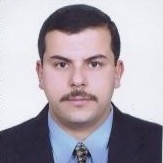
Said F. El-Zoghdy
Work place: Department of Mathematics & Computer Science, Faculty of Science, Menoufia University, Egypt
E-mail: elzoghdy@yahoo.com
Website:
Research Interests: Computer systems and computational processes, Computer Architecture and Organization, Systems Architecture, Network Architecture, Network Security, Parallel Computing
Biography
Dr. Said Fathy El-Zoghdy Was born in El-Menoufia, Egypt, in 1970. He received the BSc degree in pure Mathematics and Computer Sciences in 1993, and MSc degree for his work in computer science in 1997, all from the Faculty of Science, Menoufia, Shebin El-Koom, Egypt. In 2004, he received his Ph. D. in Computer Science from the Institute of Information Sciences and Electronics, University of Tsukuba, Japan. From 1994 to 1997, he was a demonstrator of computer science at the Faculty of Science, Menoufia University, Egypt. From December 1997 to March 2000, he was an assistant lecturer of computer science at the same place. From April 2000 to March 2004, he was a Ph. D. candidate at the Institute of Information Sciences and Electronics, University of Tsukuba, Japan, where he was conducting research on aspects of load balancing in distributed and parallel computer systems. From April 2004 to 2007, he worked as a lecturer of computer science, Faculty of Science, Menoufia University, Egypt. From 2007 until now, he is working as an assistant professor of computer science at the Faculty of Computers and Information Systems, Taif University, Kingdom of Saudi Arabia. His research interests are in load balancing in parallel and distributed systems, Grid computing, performance evaluation, network security and cryptography.
Author Articles
An Algorithm for Static Tracing of Message Passing Interface Programs Using Data Flow Analysis
By Alaa I. Elnashar Said F. El-Zoghdy
DOI: https://doi.org/10.5815/ijcnis.2015.01.01, Pub. Date: 8 Dec. 2014
Message Passing Interface (MPI) is a well know paradigm that is widely used in coding explicit parallel programs. MPI programs exchange data among parallel processes using communication routines. Program execution trace depends on the way that its processes are communicated together. For the same program, there are a lot of processes transitions states that may appear due to the nondeterministic features of parallel execution. In this paper we present a new algorithm that statically generates the execution trace of a given MPI program using data flow analysis technique. The performance of the proposed algorithm is evaluated and compared with that of two heuristic techniques that use a random and genetic algorithm approaches to generate trace sequences. The results show that the proposed algorithm scales well with the program size and avoids the problem of processes state explosion which the other techniques suffer from.
[...] Read more.Other Articles
Subscribe to receive issue release notifications and newsletters from MECS Press journals